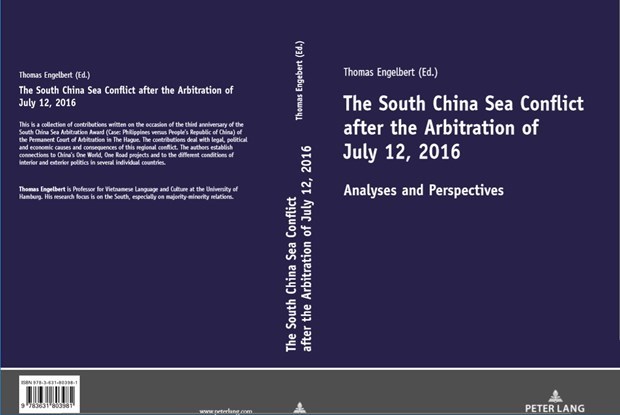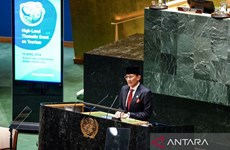Book released on occasion of third anniversary of East Sea ruling
 Photo: VietnamPlus
Photo: VietnamPlus
Hanoi (VNA) – Peter Lang, an academic publisher, has released a book on the South China Sea (called the East Sea in Vietnam) conflict which provides readers a comprehensive view of the territorial disputes after the Permanent Court of Arbitration (PCA) issued a ruling against China’s claims in the sea on July 12, 2016.
Edited by Prof. Thomas Engelbert, the book entitled “The South China Sea Conflict after the Arbitration of July 12, 2016: Analyses and Perspectives” was released at the end of last month. It is a collection of 12 research papers written on the occasion of the third anniversary of the South China Sea Arbitration Award of the Permanent Court of Arbitration in The Hague.
The research papers deal with legal, political and economic causes and consequences of the regional conflict. The authors establish connections to China’s “One World, One Road” projects and to the different conditions of interior and exterior politics in several single countries.
The authors comprise 11 leading scholars on East Sea issues in Germany and other European countries, such as Dr. Suzette-V.Suarez from Germany’s Bremen City University of Applied Sciences; Dr. Gerhard Will, Southeast Asia expert from the German Institute for International and Security Affairs (SWP); Dr. Bill Hayton, Associate Fellow with the Asia Programme at Chatham House, the Royal Institute of International Affairs in London, the UK; and Prof. Dr. Vladimir Kolotov from the Russia-based St. Petersburg State University.
The arbitral tribunal under Annex VII to the UN Convention on the Law of the Sea (UNCLOS) concluded that there was no legal basis for China to claim historic rights to resources within the sea areas enclosed by the “nine-dash” line.
There was no evidence that China had historically exercised exclusive control over the South China Sea or its resources, said the five-member tribunal of maritime affairs experts at The Hague as they issued the ruling over the case filed by the Philippines to contest China’s claims and activity in the South China Sea.
"None of the Spratly Islands are capable of generating extended maritime zones," and that “none of the features claimed by China were capable of generating an exclusive economic zone,” the ruling said.
The tribunal also said that China had contravened international law when it “violated the Philippines’ sovereign rights in its exclusive economic zone” and by failing to prevent Chinese fishermen from harvesting endangered sea turtles and other species “on a substantial scale.”
In terms of effects on the marine environment, the tribunal found that China had “caused severe harm to the coral reef environment”.
Finally, the tribunal found that China’s recent large-scale land reclamation and construction of artificial islands was incompatible with the obligations of a State during dispute resolution proceedings.
In 2013, the Philippines brought the case to the court, asking it to reject China’s claims to sovereignty over as much as 90 percent of the South China Sea, marked by a "nine-dash line" on official Chinese maps. It also accused China of interfering with fishing, dredging sand to build artificial islands, and endangering ships, among other claims.
China has boycotted the tribunal from the very beginning, saying that the panel has no jurisdiction. It has already said it will not "accept, recognise or execute" the decision.
Legally, the Permanent Court of Arbitration’s decision will be binding. However, there is no ability to enforce the ruling.
The UNCLOS, originally agreed to in 1982, was designed to allow countries to clearly define areas of control off their coastline.
An island controlled by a country is entitled to "territorial waters" of 12 nautical miles (22 kilometres) as well as an Exclusive Economic Zone (EEZ) – whose resources, such as fish – the country can exploit, of up to 200 nautical miles (370 kilometres).
A rock owned by a state will also generate a 12 nautical mile territorial border but not an economic zone under the UNCLOS, while a low-tide elevation grants no territorial benefits at all.
Both China and the Philippines are signatories to the UNCLOS, as is Vietnam./.










